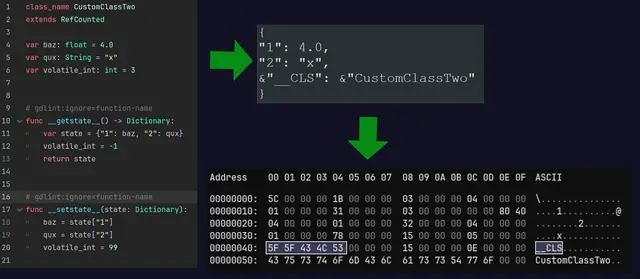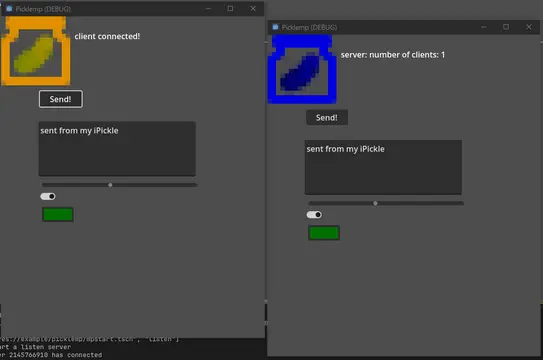Install Asset
Install via Godot
To maintain one source of truth, Godot Asset Library is just a mirror of the old asset library so you can download directly on Godot via the integrated asset library browser



Quick Information

PickleGD is a Godot asset for safely serializing arbitrary godot data structures, including custom classes, over multiplayer and to disk.Tested with: Godot Engine v4.4.stable.official.4c311cbee This is a system for "pickling" GDScript objects to byte arrays, using native var_to_bytes plus some code inspection magic. It's meant to make it easy for youto send complex data structures (such as large custom classes) over the networkto multiplayer peers, or to create your own save system. PickleGD is designedto prevent arbitrary code execution in the serialization and deserializationprocess.Note: this asset is not compatible with Python's pickle format.# Quick Start exampleTo get started pickling your data, first create a pickler.```var pickler = Pickler.new()```If you have custom classes you want to register, register them at scene load time:```pickler.register_custom_class(CustomClassOne)pickler.register_custom_class(CustomClassTwo)```If you want to register godot engine native classes, you must use the class nameas a string:```pickler.register_native_class("Node2D")```Now you are ready to pickle your data! On the sender's side, just pass your datato `picker.pickle()`, send the resulting PackedByteArray, then at the receiver'sside pass the PackedByteArray to `pickler.unpickle()`.```var data = {"one": CustomClassOne.new(),"things": ["str", 42, {"foo":"bar"}, [1,2,3], true, false, null],"node": Node2D.new(),}var pba: PackedByteArray = pickler.pickle(data)# "unpickled" should be the same as "data"var unpickled = pickler.unpickle(pba)```# Compressing a pickleYou can create smaller pickles by setting `Pickler.serialize_defaults` to `false`,which removes default values from pickled Objects.You can create compressed binary pickles using `Pickler.pickle_compressed()`.# Customizing a pickleYou can also have direct control over which properties are serialized/deserialized by adding`__getnewargs__()`, `__getstate__()` and `__setstate__()` methods to your custom class.Check out README.md in the git repository for more info on how to customize and optimize your pickles.
PickleGD
PickleGD is a Godot asset for safely serializing arbitrary godot data structures, including custom classes, over multiplayer and to disk.
Tested with: Godot Engine v4.4.stable.official.4c311cbee
This is a system for "pickling" GDScript objects to byte arrays, using native var_to_bytes plus some code inspection magic. It's meant to make it easy for you to send complex data structures (such as large custom classes) over the network to multiplayer peers, or to create your own save system. PickleGD is designed to prevent arbitrary code execution in the serialization and deserialization process.
Note: this asset is not compatible with Python's pickle format.
Quick Start example
To get started pickling your data, first create a pickler.
var pickler = Pickler.new()
If you have custom classes you want to register, register them at scene load time:
pickler.register_custom_class(CustomClassOne)
pickler.register_custom_class(CustomClassTwo)
If you want to register godot engine native classes, you must use the class name as a string:
pickler.register_native_class("Node2D")
Now you are ready to pickle your data! On the sender's side, just pass your data
to picker.pickle(), send the resulting PackedByteArray, then at the receiver's
side pass the PackedByteArray to pickler.unpickle().
var data = {
"one": CustomClassOne.new(),
"things": ["str", 42, {"foo":"bar"}, [1,2,3], true, false, null],
"node": Node2D.new(),
}
var pba: PackedByteArray = pickler.pickle(data)
# "unpickled" should be the same as "data"
var unpickled = pickler.unpickle(pba)
Compressing a pickle
You can create smaller pickles by setting Pickler.serialize_defaults to false,
which removes default values from pickled Objects.
You can create compressed binary pickles using Pickler.pickle_compressed().
Customizing a pickle
You can also have direct control over which properties are serialized/deserialized by adding
__getnewargs__(), __getstate__() and __setstate__() methods to your custom class.
The Pickler will first call __getnewargs__() to get the arguments for the
object's constructor, then
will call __getstate__() to retrieve an Object's properties during
serialization, and later will call __setstate__() to set an Object's properties
during deserialization. You may also use these methods to perform
input validation on an Object's properties.
__getnewargs__() takes no arguments, and must return an Array.
__getstate__() takes no arguments, and must return a Dictionary.
__setstate__() takes one argument, the state Dictionary, and has no return value.
For example:
extends Resource
class_name CustomClassNewargs
var foo: String = "bluh"
var baz: float = 4.0
var qux: String = "x"
func _init(new_foo: String):
foo = new_foo
func __getnewargs__() -> Array:
return [foo]
func __getstate__() -> Dictionary:
return {"1": baz, "2": qux}
func __setstate__(state: Dictionary):
baz = state["1"]
qux = state["2"]
The PicklableClass for an Object type that is created at registration time also has
__getnewargs__(), __getstate__() and __setstate__() functions you can override.
PickleGD is a Godot asset for safely serializing arbitrary godot data structures,
including custom classes, over multiplayer and to disk.
Tested with: Godot Engine v4.4.stable.official.4c311cbee
This is a system for "pickling" GDScript objects to byte arrays, using native
var_to_bytes plus some code inspection magic. It's meant to make it easy for you
to send complex data structures (such as large custom classes) over the network
to multiplayer peers, or to create your own save system. PickleGD is designed
to prevent arbitrary code execution in the serialization and deserialization
process.
Note: this asset is not compatible with Python's pickle format.
# Quick Start example
To get started pickling your data, first create a pickler.
```
var pickler = Pickler.new()
```
If you have custom classes you want to register, register them at scene load time:
```
pickler.register_custom_class(CustomClassOne)
pickler.register_custom_class(CustomClassTwo)
```
If you want to register godot engine native classes, you must use the class name
as a string:
```
pickler.register_native_class("Node2D")
```
Now you are ready to pickle your data! On the sender's side, just pass your data
to `picker.pickle()`, send the resulting PackedByteArray, then at the receiver's
side pass the PackedByteArray to `pickler.unpickle()`.
```
var data = {
"one": CustomClassOne.new(),
"things": ["str", 42, {"foo":"bar"}, [1,2,3], true, false, null],
"node": Node2D.new(),
}
var pba: PackedByteArray = pickler.pickle(data)
# "unpickled" should be the same as "data"
var unpickled = pickler.unpickle(pba)
```
# Compressing a pickle
You can create smaller pickles by setting `Pickler.serialize_defaults` to `false`,
which removes default values from pickled Objects.
You can create compressed binary pickles using `Pickler.pickle_compressed()`.
# Customizing a pickle
You can also have direct control over which properties are serialized/deserialized by adding
`__getnewargs__()`, `__getstate__()` and `__setstate__()` methods to your custom class.
Check out README.md in the git repository for more info on how to customize and optimize your pickles.
Reviews
Quick Information

PickleGD is a Godot asset for safely serializing arbitrary godot data structures, including custom classes, over multiplayer and to disk.Tested with: Godot Engine v4.4.stable.official.4c311cbee This is a system for "pickling" GDScript objects to byte arrays, using native var_to_bytes plus some code inspection magic. It's meant to make it easy for youto send complex data structures (such as large custom classes) over the networkto multiplayer peers, or to create your own save system. PickleGD is designedto prevent arbitrary code execution in the serialization and deserializationprocess.Note: this asset is not compatible with Python's pickle format.# Quick Start exampleTo get started pickling your data, first create a pickler.```var pickler = Pickler.new()```If you have custom classes you want to register, register them at scene load time:```pickler.register_custom_class(CustomClassOne)pickler.register_custom_class(CustomClassTwo)```If you want to register godot engine native classes, you must use the class nameas a string:```pickler.register_native_class("Node2D")```Now you are ready to pickle your data! On the sender's side, just pass your datato `picker.pickle()`, send the resulting PackedByteArray, then at the receiver'sside pass the PackedByteArray to `pickler.unpickle()`.```var data = {"one": CustomClassOne.new(),"things": ["str", 42, {"foo":"bar"}, [1,2,3], true, false, null],"node": Node2D.new(),}var pba: PackedByteArray = pickler.pickle(data)# "unpickled" should be the same as "data"var unpickled = pickler.unpickle(pba)```# Compressing a pickleYou can create smaller pickles by setting `Pickler.serialize_defaults` to `false`,which removes default values from pickled Objects.You can create compressed binary pickles using `Pickler.pickle_compressed()`.# Customizing a pickleYou can also have direct control over which properties are serialized/deserialized by adding`__getnewargs__()`, `__getstate__()` and `__setstate__()` methods to your custom class.Check out README.md in the git repository for more info on how to customize and optimize your pickles.
